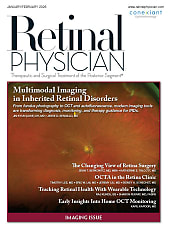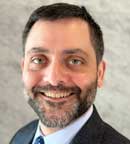A transcript of the video narration is below:
Hi, my name is Mark Barakat, MD, from Retina Macular Institute of Arizona, talking to you a little bit about the presentation I gave at Retina World Congress on an update on the PRISM clinical trial for 4D-150 (4DMT) for wet AMD. Now, 4D-150 is an R100 AAV capsid that delivers a dual transgene payload, 1 that's aflibercept and 1 that is an inhibitory RNA that prevents production of VEGF-C. The PRISM trials have shown expression of aflibercept up to 104 weeks with stable visual acuity and optical coherence tomography findings in phase 1, phase 2a, and phase 2b. Phase 2b is the expansion population, which showed that about 57% of those patients were injection free at 52 weeks and about 70% of patients received 1 supplemental injection or fewer. Also, in patients within that cohort who were diagnosed 6 months or sooner, so they're recently diagnosed, that injection-free percentage goes up to 80%.
There are quite robust findings in terms of efficacy, This is early potential, of course. In terms of safety, this looked really promising as well. There were 2.8% of patients who received the 3E10 vg/eye dose who experienced a transient cell that was well treated and well tolerated in these patients, and 99% of patients were able to complete their steroid taper on time. Of course, there's a steroid taper involved, as with most gene therapies.
In a nutshell, here we have an intravitreal agent that is injected to help express aflibercept and VEGF-C inhibitor RNA that's shown good response or good signs of response, both protein levels in terms of reduction in their anti-VEGF treatment needs and also really good safety with a steroid taper. This of course translates to pivotal phase 3 trials 4FRONT-1 and 4FRONT-2, which are currently ongoing with 2 arms that are randomized. One arm receives the aflibercept control and the other arm receives 2 aflibercept injections, 4D-150, then aflibercept afterwards, and is followed for signs of efficacy and durability. We look forward to the results coming out. Hopefully at some point in the future, this will give us another option in our toolkit to treat these patients that need a lot of treatments. And with that, I thank you so much. RP









